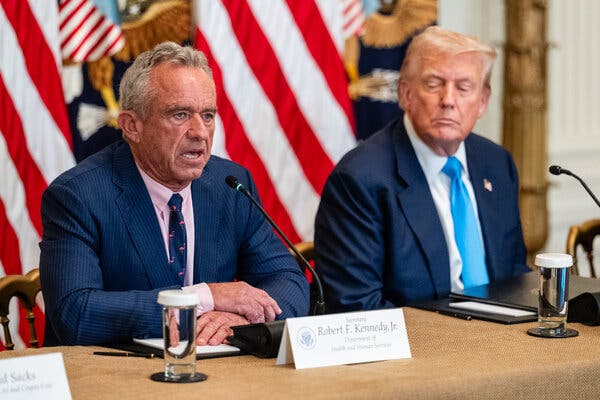Health
U.S. Health Department Reinstates Vaccine Safety Task Force

The U.S. Department of Health and Human Services (H.H.S.) has reinstated the Task Force on Safer Childhood Vaccines, a panel that was originally established in the 1980s and disbanded in 1998. This move, announced on Thursday, is part of the Trump administration’s ongoing efforts to examine the safety of vaccines administered to children across the United States.
The task force was initially created following the passage of the National Childhood Vaccine Injury Act, which set up mechanisms for addressing claims of vaccine-related injuries. The reinstatement aims to enhance the safety and efficacy of vaccines, reflecting a commitment to public health, according to officials.
Dr. Jay Bhattacharya, director of the National Institutes of Health (N.I.H.), expressed strong support for the task force’s revival. He stated, “By reinstating this Task Force, we are reaffirming our commitment to rigorous science, continuous improvement, and the trust of American families.” He emphasized N.I.H.’s leadership in advancing vaccine safety while ensuring that innovations protect children without compromise.
The H.H.S. plans to submit the task force’s first formal report to Congress within two years and will provide updates every two years thereafter. This structured approach aims to keep lawmakers and the public informed about vaccine safety developments.
While many experts support the goal of improving vaccine safety, there are concerns about potential misinterpretations of the task force’s intentions. Dr. Eric Rubin, editor-in-chief of The New England Journal of Medicine and an adviser to the Food and Drug Administration (F.D.A.), voiced apprehension that the panel might inadvertently create a perception of vaccines as dangerous. He stated, “I hope the task force does not overemphasize potential, and very theoretical, risks over the benefits of childhood immunizations.”
Vaccines have historically played a crucial role in public health, saving over 1.1 million lives and preventing around 32 million hospitalizations among children born between 1994 and 2003, according to the Centers for Disease Control and Prevention (C.D.C.). Additionally, vaccines have contributed to an estimated savings of $2.7 trillion in societal costs, highlighting their importance in maintaining public health.
Dr. Ofer Levy, director of the precision vaccines program at Boston Children’s Hospital, remarked, “For 99.99999 percent of the kids, vaccines are a huge win and critical for their healthy growth and development.” He raised a pertinent question, asking how to ensure that safety measures do not undermine the benefits that vaccines provide.
The task force will include senior leaders from the N.I.H., F.D.A., and C.D.C., with Dr. Bhattacharya serving as its chairman. Dr. Rubin noted that having experienced members on the panel is reassuring but emphasized the importance of selecting well-trained experts for its composition.
As the task force begins its work, the focus will be on balancing the ongoing need for vaccine safety with the established benefits that immunizations provide to children and society as a whole. With a significant role in promoting public health, the task force’s actions are poised to shape future vaccine policies and public perceptions.
-

 Technology5 months ago
Technology5 months agoDiscover the Top 10 Calorie Counting Apps of 2025
-

 Health2 months ago
Health2 months agoBella Hadid Shares Health Update After Treatment for Lyme Disease
-

 Health3 months ago
Health3 months agoErin Bates Shares Recovery Update Following Sepsis Complications
-

 Technology4 months ago
Technology4 months agoDiscover How to Reverse Image Search Using ChatGPT Effortlessly
-

 Technology1 month ago
Technology1 month agoDiscover 2025’s Top GPUs for Exceptional 4K Gaming Performance
-

 Technology2 months ago
Technology2 months agoElectric Moto Influencer Surronster Arrested in Tijuana
-

 Technology5 months ago
Technology5 months agoMeta Initiates $60B AI Data Center Expansion, Starting in Ohio
-

 Technology5 months ago
Technology5 months agoRecovering a Suspended TikTok Account: A Step-by-Step Guide
-

 Health4 months ago
Health4 months agoTested: Rab Firewall Mountain Jacket Survives Harsh Conditions
-

 Lifestyle5 months ago
Lifestyle5 months agoBelton Family Reunites After Daughter Survives Hill Country Floods
-

 Technology4 months ago
Technology4 months agoHarmonic Launches AI Chatbot App to Transform Mathematical Reasoning
-

 Technology3 months ago
Technology3 months agoUncovering the Top Five Most Challenging Motorcycles to Ride


















